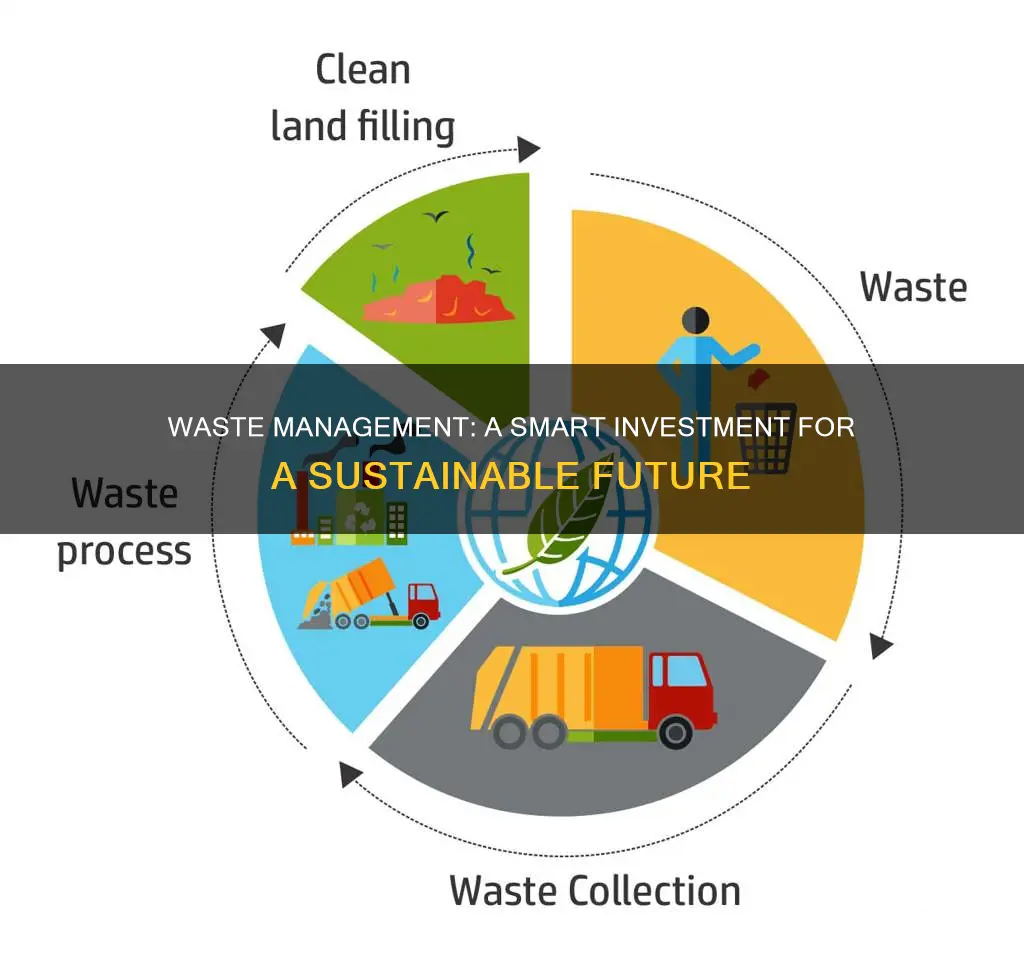
Investing in waste management is a prudent decision, as it is a profitable and stable industry that has demonstrated strong financial performance and growth potential. Waste Management, Inc., for instance, has outperformed its industry peers and the S&P 500, offering impressive returns and consistent earnings growth. The company's commitment to sustainability and recycling, along with its ability to navigate challenging business climates, makes it an attractive investment opportunity. With a strong balance sheet, disciplined growth, and recession-resilient revenues, waste management companies provide healthy investment options and contribute to environmental goals.
What You'll Learn
- The waste management industry is recession-resilient, with strong and consistent cash flow
- Waste management companies have diversified revenue streams from various industries
- The industry has strong growth prospects, with a focus on differentiation and continuous improvement
- Waste management stocks have historically outperformed the market, with strong returns
- Investing in waste management can help reduce environmental impacts and promote sustainability

The waste management industry is recession-resilient, with strong and consistent cash flow
The waste management industry has proven to be recession-resilient, with strong and consistent cash flow. This is evident through Waste Management's performance during the COVID-19 pandemic, where revenue was down less than 2% while net income and free cash flow (FCF) remained stable. The company's long-term contracts and diversified revenue streams from various industries, including residential, commercial, and industrial customers, contribute to its resilience.
Waste Management's ability to maintain strong cash flow during economic downturns is further demonstrated by its history of dividend raises and share buybacks. In 2019, the company paid out $440 million in dividends and repurchased shares worth $248 million. This trend continued in 2018, with $802 million in dividends paid out and $1.004 billion in share buybacks. Such actions showcase the company's commitment to creating value for shareholders.
The solid waste management industry's resilience can be attributed to its business model, which generates revenue through collecting, transporting, and disposing of trash and recycling. During the pandemic, while business slowed in the commercial and industrial sectors, residential business increased as people spent more time at home. This diversification of revenue streams helps to stabilize cash flow.
Additionally, Waste Management's commercial and industrial customers tend to have long-term service agreements, with an average retention period of 10 years. This provides a consistent source of revenue and contributes to the company's strong cash flow. The company's performance during the pandemic is a testament to its ability to navigate challenging business climates and maintain strong financial metrics.
Waste Management's recession-resilience is further evidenced by its ability to generate consistent earnings growth. The company has a history of raising prices and improving efficiency, which contributes to its strong cash flow. The waste management industry's nature, where garbage is viewed as a resource, ensures a steady stream of revenue and cash flow, even during economic downturns.
Understanding Pips: Portfolio Investment Strategy Basics
You may want to see also

Waste management companies have diversified revenue streams from various industries
Waste Management Inc. is the largest waste and recycling services provider in North America, and its ability to tap into multiple sectors for revenue has contributed to its success. The company's long-term contracts with commercial and industrial customers, which tend to span multiple years, further bolster their financial stability.
Other major players in the waste management industry also demonstrate diversified revenue streams. Veolia, the largest waste management company in the world, provides water, waste, and energy management services, reporting over 50 billion US dollars in revenue in 2023. Similarly, companies like Bingo Industries Limited, Casella Waste Systems, Inc., and US Ecology, Inc. offer a range of waste management and recycling services to residential, commercial, and industrial clients, generating substantial revenue.
The waste management industry's ability to serve diverse sectors and adapt to changing market demands makes it an attractive investment prospect, particularly for those seeking stable and consistent returns.
Proxy Rights: Who Holds the Power in Investment Management?
You may want to see also

The industry has strong growth prospects, with a focus on differentiation and continuous improvement
The waste management industry has strong growth prospects, underpinned by its focus on differentiation and continuous improvement. This is evident in several ways. Firstly, the industry has demonstrated its resilience during challenging economic periods, such as the COVID-19 pandemic. While business slowed in some sectors, waste management companies adapted by focusing on residential services and leveraging long-term contracts and diversified revenue streams. This ability to navigate uncertain times highlights the industry's stability and potential for growth.
Secondly, waste management companies are committed to driving differentiation and achieving better margins. They do this by capitalizing on their extensive assets and successful cost-reduction initiatives. For example, companies like Waste Management, Inc. have implemented effective cost-cutting measures, resulting in impressive gross margin expansion and EBITDA growth. This focus on profitability positions the industry well for future growth and expansion.
Additionally, waste management companies are exploring new avenues for revenue generation beyond traditional tipping fees. Private companies, in particular, have been at the forefront of innovation, discovering new ways to turn a profit from garbage. This includes landfill mining and reclamation, where valuable materials are extracted and reprocessed from older landfills. While economics can be a challenge in this area, successful ventures can be highly lucrative, as demonstrated by a scrap metal company's success in recovering $7.42 million worth of metal in southern Maine.
Moreover, modern chemistry has enabled the extraction of methane gas from decaying trash, creating opportunities for energy generation. Landfill gas is now a significant source of electricity, powering hundreds of thousands of homes annually. The solid waste management industry recognizes the potential of these alternative revenue streams and is well-positioned to capitalize on them, further enhancing its growth prospects.
Lastly, the industry's focus on sustainability and environmental responsibility cannot be overstated. As companies increasingly prioritize their Environmental, Social, and Governance (ESG) goals, waste management becomes a critical partner in reducing their environmental impact. By helping businesses lower their waste output and recycle more, waste management companies are not just complying with sustainability trends but also driving them. This focus on sustainability is expected to attract more investment and drive continuous improvement in the industry.
Security Analysis and Investment Management: Core Financial Concepts
You may want to see also

Waste management stocks have historically outperformed the market, with strong returns
Waste Management's resilience during the pandemic demonstrated its ability to adapt to changing market conditions. While business slowed in some sectors, the company benefited from increased residential waste as people spent more time at home. Additionally, the company's long-term contracts and diversified revenue streams from various industries in the public and private sectors contributed to its stable performance.
The company's strong financial position is further reinforced by its history of dividend raises and share buybacks. Waste Management's consistent cash flow and earnings enable it to reward shareholders and invest in growth opportunities. The company's commitment to creating value for shareholders is evident through its significant dividend payouts and share repurchase plans.
Waste Management's industry-leading position and reputation for dividend raises make it an attractive investment opportunity. As the largest waste and recycling services provider in North America, the company has a diverse customer base, including residential, commercial, and industrial clients. This diversification, along with its focused differentiation and continuous improvement strategies, contributes to its strong financial performance.
The solid waste management industry's profitability is often overlooked. The industry has outperformed the market since 2015, and companies like Waste Management have seen their stock prices double in the past five years. The solid waste management industry's success is driven by tipping fees, landfill mining, and landfill gas-to-energy projects, among other revenue streams.
Protecting Your Managed Investments: Strategies for Success
You may want to see also

Investing in waste management can help reduce environmental impacts and promote sustainability
Secondly, investing in waste management can drive innovation and efficiency in the industry. This includes finding new ways to turn a profit from garbage, such as landfill mining and reclamation, where precious metals and other materials are extracted and reprocessed from older landfills. This not only reduces the amount of waste but also generates revenue and resources.
Thirdly, investing in waste management can help to reduce the environmental impact of companies in other industries, especially those with a large carbon footprint, such as food and beverage companies. By lowering their waste output and transitioning to sustainable practices, these companies can reduce their negative impact on the environment with the help of waste management companies.
Additionally, investing in waste management can promote sustainable practices within the industry itself. For example, investing in technology and automation can lower the cost of serving customers and improve the customer experience. This can also help to differentiate the services offered by waste management companies and position them as partners to their customers in achieving sustainability goals.
Overall, investing in waste management offers a unique opportunity to reduce environmental impacts and promote sustainability. By viewing waste as a resource rather than a problem, investors can support the development of innovative solutions that turn waste into valuable products and energy sources, benefiting both the environment and society as a whole.
Savings, Investments, and the Economy: National Symbiosis
You may want to see also
Frequently asked questions
Waste management has proven to be a stable and profitable industry, even during times of economic uncertainty.
Yes, waste management companies have strong growth prospects and are committed to creating value for shareholders.
Waste management has proven to be recession-resilient, with stable revenues and consistent cash flow, making it a reliable investment during uncertain times.
Waste management companies have strong balance sheets, healthy dividend payouts, and share buyback programs, providing attractive returns for investors.
Investing in waste management supports sustainability and helps reduce environmental impacts by promoting recycling, landfill mining, and the conversion of waste into energy.







